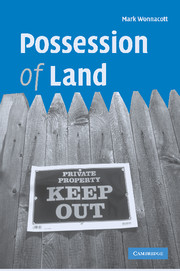Book contents
- Frontmatter
- Contents
- Preface and acknowledgments
- Table of cases
- Table of statutes
- Table of statutory instruments
- 1 Meaning of possession
- 2 Protection of possession
- 3 Possession, title and freehold land
- 4 Leases and licences
- 5 Mortgages and charges
- 6 Equity and trusts
- 7 Birth and death, dissolution and insolvency
- 8 Adverse possession and prescription
- 9 Possession judgments
- 10 Summary and conclusions
- Index
3 - Possession, title and freehold land
Published online by Cambridge University Press: 13 August 2009
- Frontmatter
- Contents
- Preface and acknowledgments
- Table of cases
- Table of statutes
- Table of statutory instruments
- 1 Meaning of possession
- 2 Protection of possession
- 3 Possession, title and freehold land
- 4 Leases and licences
- 5 Mortgages and charges
- 6 Equity and trusts
- 7 Birth and death, dissolution and insolvency
- 8 Adverse possession and prescription
- 9 Possession judgments
- 10 Summary and conclusions
- Index
Summary
Introduction
The two fundamental building blocks of English land law, notwithstanding compulsory registration, remain the doctrines of tenures and of estates.
The doctrine of tenures is about the ways in which land can be held. It means that no private person can own land absolutely. It is always held as a matter of feudal obligation of some other person, and ultimately of the Crown.
The doctrine of estates is about the ways in which a private person may alienate land so held, in both time and space. It involves ‘a recognition that the sum of possible interests in land – the fee simple – may be cut up into slices like a cake and distributed amongst a number of people, all of whom will obtain present existing interests in the land, though their right to actual enjoyment, to seisin in demesne, may be postponed.’
This chapter is about the relationship between possession, title, tenure and estates.
It is, in particular, about the reason why prior possession is necessarily the basis of a title to a freehold estate, and why it really should not be thought at all ‘remarkable that the law is prepared to legitimise such “possession of wrong”, which, at least in some cases, is tantamount to theft of the land.’
Crown demesne
Modern English land law began with the memorable date of the Norman conquest in 1066. It remains firmly grounded in the premise that William acquired absolute ownership of all the land in England and Wales by conquest.
- Type
- Chapter
- Information
- Possession of Land , pp. 35 - 49Publisher: Cambridge University PressPrint publication year: 2006



